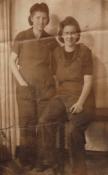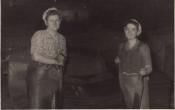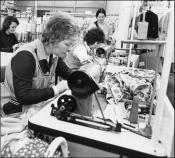Browse the interviews
Sorted by interviewee name
VSE011 Maisie Taylor, Horrock's, Cardiff;Peggy Anne, Cardiff
Maisie’s mother worked in Curran’s Factory during the war. Maisie left school at 15 (1948/9) and started in Horrocks - called Peggy Ann at the time, making children’s dresses. Horrocks took over – making bedding, dresses etc. The company had other factories and they had sales of all their products. Stayed there 10 years. Describes location of factory. Different world. Very brash women. Noise made her talk loudly. She worked on the special bench doing lots of tasks, then on the overlocker, finger caught on buttonholing machine. Periods affected her – restroom. This affected production of line. Looking after their machines. On special bench – more skilled. Describes processes. Cold and bending over machine affected her back. Xmas party for children – choosing presents. Piecework – holding back when being timed e.g. one dress in 4 minutes worth 50p. . Sewing and altering clothes at hometo supplement income. Supervisors ‘like our mums’. Music broke the monotony. Story about working late – fog and no lighting on road. Going out in Barry and Cardiff. Mentions Irene Spetti (stage name – Lorne Lesley when in factory, married to David Dickinson) and Rose Roberts – talented cabaret singers who worked in Horrocks. Tells story about supervisor (Miss Grünfeldt) offering to make her wedding dress in the factory. She still has the dress. Left factory because pregnant (1959.) Later worked in caffes etc. Factory - ’Best time of my life’VSE046 Betty Thomas, Louis Edwards, Maesteg
Betty left the grammar school at 17 (c.1966) and started in the office in Louis Edwards, as a clerk telephonist and also on the comptometer doing wages. Collected tickets from factory floor. Machinists paid more than office staff because of piecework and bonuses. She stayed here for 3 years Talks of monkey-parading to meet boys. She notes that the management were ‘foreign’. She left when she had children. Since then she has worked in shops etc. When she got married, the factory collected and gave her a huge wedding present – everything possible in Pyrex.VSW066 Enid Thomas, Fisher & Ludlow, Llanelli
Enid left grammar school at 17 (1954) and trained as a nurse. She went to work as one of the nurses in Fisher and Ludlow in 1980. The main injuries were minor ones – cuts and things in the eyes. A doctor called once a week to check whether workers were fit to return to work. She had a large room with smaller rooms emanating from it. She wore a sister’s uniform. She worked from 6-10 p.m. every evening. A male nurse worked the night shift. Other injuries: burns, twisting ankles, injuring wrists through lifting heavy objects. If they needed stitches – to hospital. She stayed there c.12 years. There was a file for every worker. She knew the shirkers but some foremen expected too much, especially from the women.VSE040 Isabel Thomas, Mansel Tinplate Works, Aberafan;Wern Aluminium works, Aberafan;Metal Box, Neath
Isabel left school at 14 (1942) and went to work in Mansel Tinplate (she was an orphan). Her sister was working there and told the manager Isabel was 16. She learned various tasks: on sheers, guillotine. She cheated her age again to go to the Wern. She describes cutting the tin plate and women also worked the roller there. It went into water and had to be straightened again. Dungarees with patches. Cut fingers. One women killed in the aluminium works. Isabel was overworked. Shift work in the Wern. One boy was killed in the Mansel too – the sheets fell on him. In the Wern the aluminium was coming out of the salt bath hot. They wore thick gloves. Union member. Learning to swear. Story about giving the foreman a laxative. Describes her work in the Wern. Scraping aluminium – half hour on half off - in restroom. Her sister made a rag mat – from someone’s coat! Singing with the piano in the canteen in Wern. Men home from war to the women’s jobs and having much better pay. Dances and music. Not allowed to go to Margam during the war because there were Americans there. Notes racism. She stayed in the Wern 5 years but they cut her wage and she moved to the canteen. She was in the Mansel for 2 years. She worked then in Metal Box for three months c. 1952. She made lids for tomato tins – cushy job.Part of this interview is available as an audio file


VSW010 Phyllis Eldrige & Olga Thomas, Cardwells, Lampeter;Cardwells, Machynlleth
Phyllis left school at 16 (c.1959) and stayed home on the farm for 3 years before replying to an advert in the paper for a machinist at Cardwells'. A bus took them to Machynlleth. Stayed in lodgings. Olga left school at 15 years (1959), worked in an egg packing factory and then in Cardwells' Machynlleth. They also travelled by train. They earned £4 a week + lodging + travelling. Stayed there one year, until the Lampeter factory was ready. The factory was closed for weeks in 1963 - snow but no pay. Girls came from the outlying villages. They made women's dresses mainly. Can't remember a union - just 'grin and bear it'. They had the off-cuts. Needles through fingers. Sewing was skilled work V ironing. They spoke Welsh mainly. They left when expecting baby. Phyllis bought a machine and worked from home. It gave them satisfaction to see women out in clothes they had made.VN034 Merfyn Tomos, Elephant Chemicals, Barmouth
Merfyn left school at 18 yn 1969 with the intention of doing a degree and following a career in libarianship. He was in his element reading and had an uncle who was a librarian and was a big influence on him. After leaving school, he needed a summer job to earn a bit of pocket money, and a friend had got a job in Elephant Chemicals, Barmouth, and Merfyn contacted them and got a casual job there. He doesn't remember a formal interview but does remember his first impression of the place - machines and shiny brick walls, like a warehouse, with women in aprons and coats, some with scarves on their heads. There were mostly women but some men too who did things like repairing the machines and loading the lorries. There was a lot of leg pulling, since a lot of the workers were young, although it was a small place, about 25 people. It was an old building that had been adapted for use, he thinks, and the factory made things like toilet blocks and disinfectants. Mefyn remembers a lot of cameraderie among the young temporary workers and is still in touch with a couple. He went on to university to study librianship.VSW049 Monica Walters, Smiths Crisps, Fforestfach
Monica left school at 15 (1952) and went to work in Woolworth’s but within months was in Smiths’ Crisps. At first she stamped numbers on tins of crisps and stacked them for the lorries. Then she moved to boxing. Then they had a machine and she would take tins off the rollers, take packets off the trays and put lids on. Picking up so many packets of crisps wore her fingers down. Nurse examining fingers every morning. She had to do 800 tins a day for her wages + bonus for every hundred after. Upstairs they made the crisps – horrible smell. Very busy in summer, time dragged in winter. She wore a big thick apron for boxing work. Bonus and dinner Xmas time. Turban provided. Tins numbered. Music played and some workers jived. She left when she got married c.1957 – her husband disapproved. Teasing the men drivers. Annual trip. On her marriage they gave her a Westminster chime clock.VSW058 Patricia Prudence White, RSW garment factory, Cwmbran;Lotery's Factory, Newport
Patricia left school at 15 (c.1951) and hoped to go to university, but her brother needed an apprenticeship instead. Describes how her mother was treated unfairly by Redifusion. Factory work had a stigma, but wages good. Lotery’s made uniform tailoring. She did an evening class in dress making and design at the same time. She wrote operas and did crossword puzzles to occupy her mind. Working on the overlocker was ‘mindless’. People there from different backgrounds and abilities. Expert lip reading and no secrets. Rivalry between smokers and non-smokers about productivity. Intricacies of piece-work – a lot to learn. Time and motion strategies. Concise movements made work more efficient. Challenging the manager by singing. Union relationship with management poor. After a time driving a minibus, she was offered a job at RSW. Career details: Lotery’s c.7-8 years (c.1951-8), c. six months in Western Biscuits; returned to Lotery’s (c.1960-4/5) as machinist then trainer. She worked for RSW 1974-78.No transcript of the interview is available

